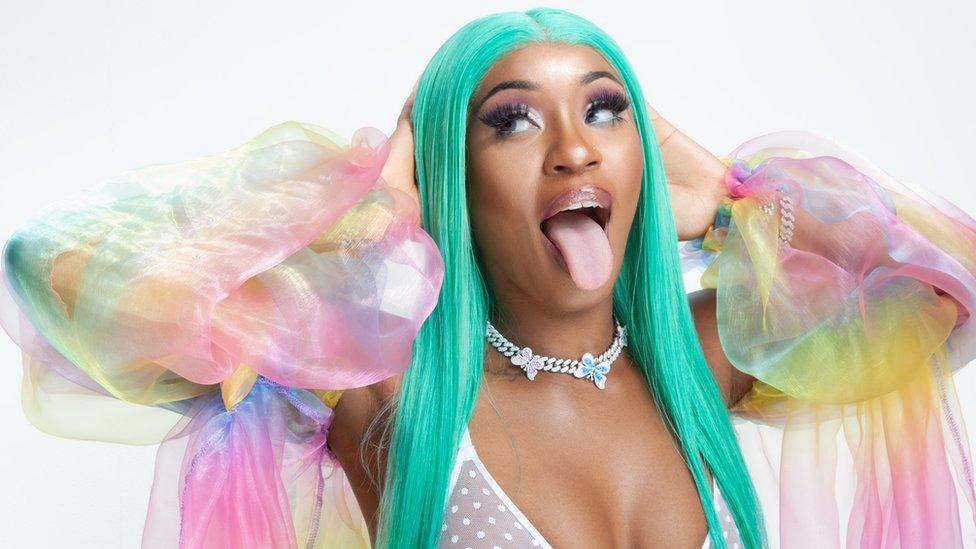BBC Sound of 2021: Berwyn's breakthrough songs of 'blood, sweat and tears'
- Published
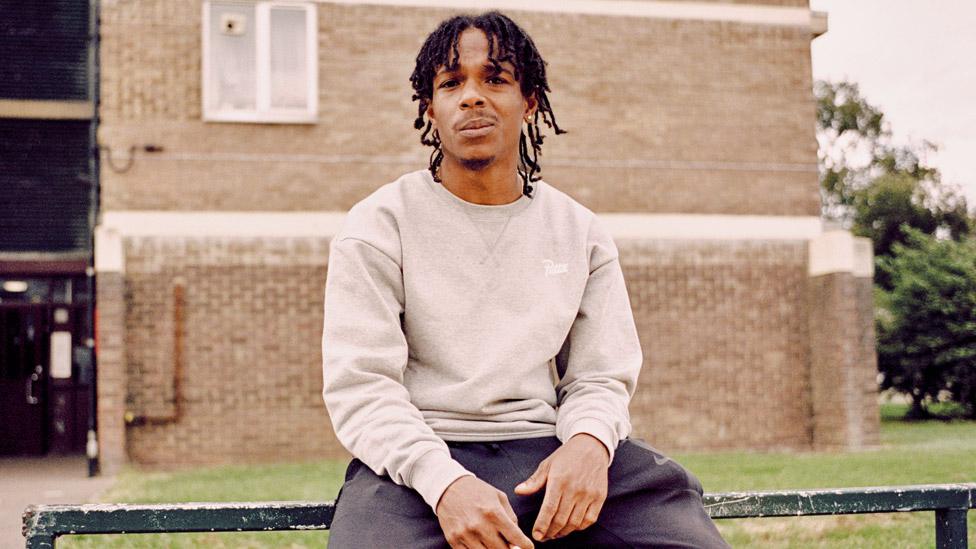
Berwyn: "I knew I was at the very bottom of the pile"
Two years ago, Trinidad-born, London-based singer and rapper Berwyn was sleeping on a mattress on a bare floor when he decided he had a choice.
Either he would go all-out to try to make a go of music, or he would give up.
What followed was a two-week burst of intense creativity during which he poured his heart into a collection of achingly personal songs about struggling to balance heartache with hope. "Blood, sweat and tears," he says.
Fast-forward to October 2020, and those intimate songs became his debut album Demotape/Vega. They have also earned him a record deal with Sony, and now third place on the BBC Sound of 2021 list, which is being revealed this week.
Berwyn's blend of haunting hip-hop and downbeat R&B puts him in the company of singers like James Blake and Sampha.
For an appearance on the BBC's Later... With Jools Holland in June, he recorded his song Glory in front of his mum in the kitchen, adding an extra verse about racism in response to Black Lives Matter.
His music has even accompanied poet Michael Rosen on Newsnight, external, and his latest single Vinyl proves his songs can be both heartfelt and hook-filled.
Allow YouTube content?
This article contains content provided by Google YouTube. We ask for your permission before anything is loaded, as they may be using cookies and other technologies. You may want to read Google’s cookie policy, external and privacy policy, external before accepting. To view this content choose ‘accept and continue’.
Berwyn Du Bois moved from Trinidad and Tobago to Romford, east London, at the age of nine. There, his school music teacher took him under her wing - and to folk clubs (evidence exists, external of a young Berwyn at one such club performing an impressive Ed Sheeran cover).
Much of the rest of his life story is laid out in the lines of his songs - his thwarted attempt to go to university, his mum's spell in jail and his struggles to survive.
He makes poetry out of violence ("Bodies drop like flies/Bonnies wanting Clydes/Clydes dying long before their times"), homelessness ("How come sleeping in a car only filled me with drive/It was just me, myself, the stars and my guitar in the night"), and his dreams of escape ("When I close my eyes, I see stadium lights").
He talked to BBC News about the obstacles he has faced and his dreams for the future - from becoming the next Dr Dre to being prime minister of Trinidad.


What happened a couple of years ago to give you such a burst of creativity?
I felt as though I had two options - plan A and plan B, and I might as well try the plan A, and just try as hard as you can. I actually ended up making the decision further to that to still go to the plan B anyway. I was going to go home and give up.
And then a friend of mine, my previous manager, ended up calling and saying that he'd heard the music from a friend of a friend of a friend, and that I should hang around and we'll do stuff with it, and that was the beginning of a very long story.
So what does it mean now that, according to your Spotify Wrapped, you had two million streams in 92 countries in 2020?
Apparently there were 59 people who listened to me [more than anyone else]. I know I am at the bottom building up. But it's trippy. Fifty-nine people listened to me more than anybody else. Bon Jovi! Jimi Hendrix! Drake! There are huge names that have existed! That is a trip beyond trips.
How did you get into making music?
In year 11, we gained a really, really good teacher. She was so invested and so committed to making sure our future was sound. She really went the extra mile.
There was one computer and I would sit on that computer any time I had the chance. After school I was on it from three o'clock, when school finished, till seven in the evening sometimes, and she would sit there on her computer finding something to do just so I could be up there. That level of commitment - oh my God. None of this was existing without it.
What's her name?
Di Russell. Those are the little things that make such a crucial difference. She understood the importance of keeping me distracted in the right ways. We used to go to this folk club on a Wednesday evening. These people would show me so much love. That's a special woman. Shout out Di.
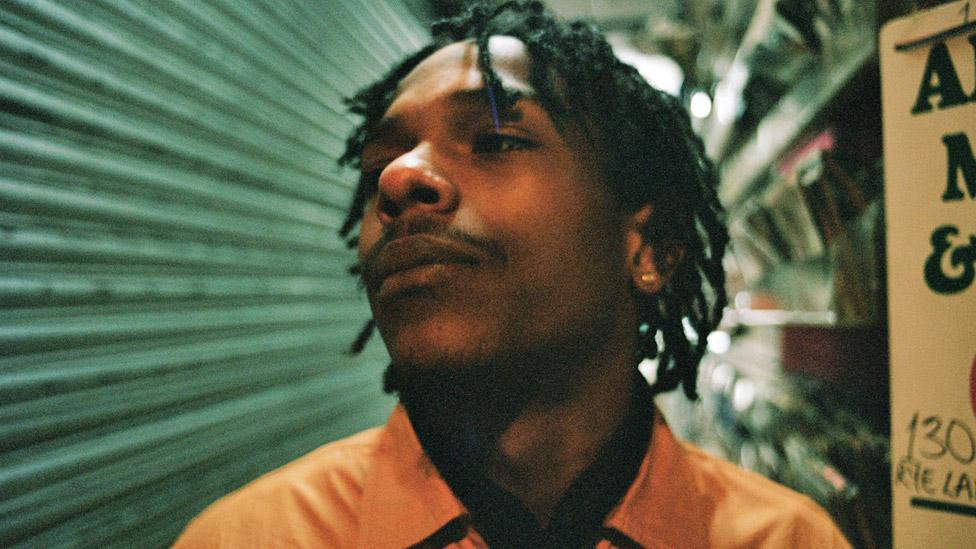
So did you get into folk?
I am still. I'm a storyteller myself. That's folk, isn't it? It's a tale, even if it's a fictional tale or a tale of some battle that happened, it's all storytelling.
Your Spotify biography talks about getting great grades but not being allowed to go to uni.
They were more than good enough. I wasn't allowed to go to uni. Immigration matters. Political issues. Surely there are loads of kids out there right now with that problem and I think about them all the time. And it made being in school very futile. I remember sitting in the exam halls and feeling the futility in it, but doing it anyway. Kind of stupid. In hindsight, kind of not.
What path did that put you on?
It put me on a path away from my friends and very much by myself because I couldn't go to uni. There's a psychological repercussion to that - a lack in growth and experience. Also I wasn't allowed to earn a living at the time so I could do what I could to make a living, so life wasn't the easiest thing to do when the day came. But in hindsight I'm grateful and thankful for every single day still.
That biog also says you're "grateful to have had the chance to be at the VERY bottom of the pile". Is that how it felt?
I knew I was at the very bottom of the pile. I don't need to express all the political reasons, but that wasn't something I was under the assumption of, that was something I was under the political enforcement of.
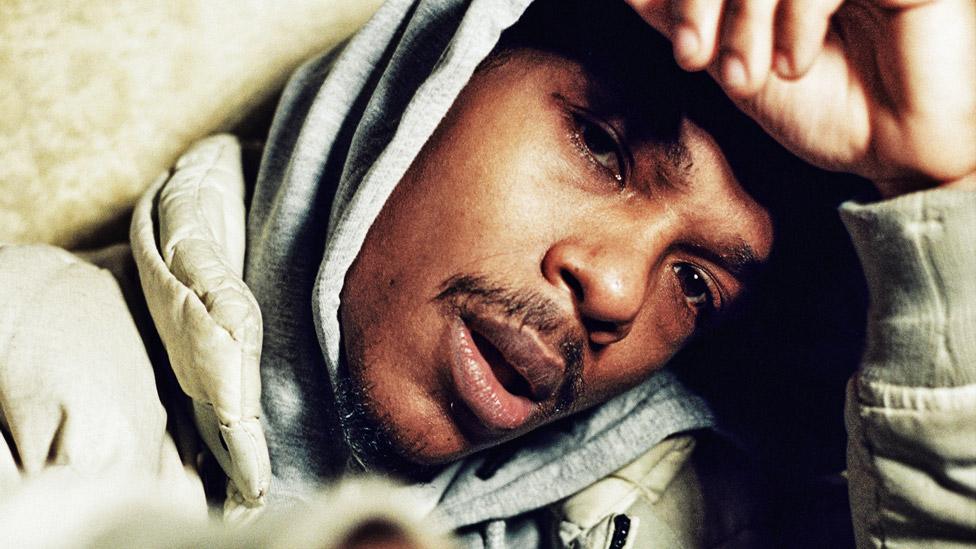
In Glory, you sing about wanting to go from making sandwiches for doctors in Subway to being the next Dr Dre.
I worked in a Subway in the hospital, so I served 80% doctors on a daily basis.
Is that your aim, to reach the heights of Dr Dre?
The next Dr Dre? Dr Dre couldn't sing.
Better than Dr Dre?
I wouldn't make a very convincing Dr Dre either - I'm tiny. In terms of my overall ambitions, if there's anything I see at the end of the tunnel, if it were to exist, I plan to be prime minister of Trini one day. I am going to be prime minister of Trini.
I've been saying that since I was like 17 years old. It's always been my job, I just haven't taken it yet. It's not even that I'm in love with politics or anything like that. I'm in love with Trinidad.
It must be a big part of you.
Especially with the situations I've had to go through, I think it was a hugely important factor, having a psychological home. At least an identity that leads back to a place. A sense of yourself.
Allow YouTube content?
This article contains content provided by Google YouTube. We ask for your permission before anything is loaded, as they may be using cookies and other technologies. You may want to read Google’s cookie policy, external and privacy policy, external before accepting. To view this content choose ‘accept and continue’.
Why did you perform Glory for Later... With Jools in the way you did?
We just thought a wholesome approach would suit the record we were playing. And also there was a slight juxtaposition, the world was almost burning down at the time. It was weird, it was the biggest moment of my life and then I'm this dirty thing when I scroll through my phone, and I'm this promised thing when I play the keyboards. I just had so many worlds to live in, so I decided to write that third verse - the slightly controversial one.
When you sing about stuff you've been through, does it help you process it?
It's quite weird, the fact that you take your pain, you put it on paper, you go over here and you make a beat and then all of a sudden you can dance to the thing that had you crying in bed yesterday, and you will never cry about it again. It's a weird medicine thing and you didn't even know it existed until the day you tasted it. There's no better therapy, I don't think.
Have you got lots more music that you've written since the album?
Unfortunately I'm fortunate to be blessed with the curse of having so many songs. But it's nice. It can never be a problem really but it's hard to not feel like a problem. I've put my foot on writing songs for a bit. We're sitting on 150 plus, a ridiculous amount of songs. We've just got to make an album out of that. Maybe two.
Are the newer songs different from what's on the album?
In terms of the sounds I've been exploring, I've been ambitious and really approaching hit status quality. Just being ambitious and saying, I know I'm not good enough, but I'm going to try to be. And you get there in the end, right?
Related topics
- Published4 January 2021
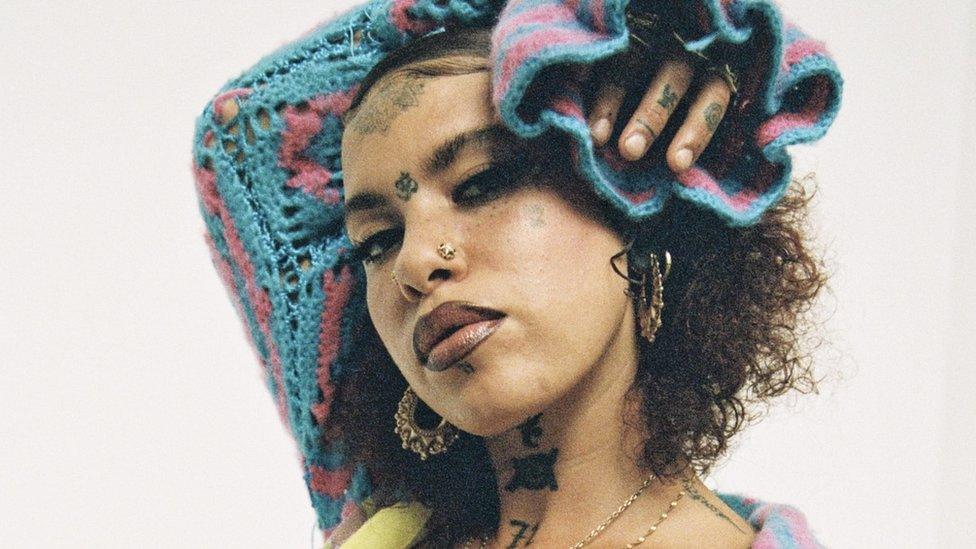
- Published3 January 2021

- Published6 December 2020

- Published17 December 2020
